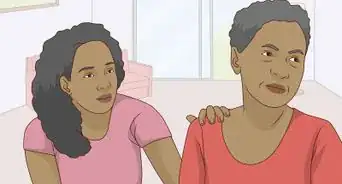wikiHow is a “wiki,” similar to Wikipedia, which means that many of our articles are co-written by multiple authors. To create this article, 31 people, some anonymous, worked to edit and improve it over time.
wikiHow marks an article as reader-approved once it receives enough positive feedback. In this case, 95% of readers who voted found the article helpful, earning it our reader-approved status.
This article has been viewed 290,429 times.
Learn more...
Codependency is a disease of the Self, generally passed down through families. A codependent person cannot access his or her innate self for internal cues, and instead organizes thinking around another person, process, or substance.
Steps
-
1Understand signs of codependency. There are many signs. One of them is dysfunctional boundaries. Like boundaries with personal "physical" space, (ie. standing too close to someone in an elevator) people in codependent relationships interfere with others by invading emotional space, allowing others to invade theirs, and having trouble distinguishing their own feelings, needs, and responsibilities from other people. You realize you feel uncomfortable not giving help when asked, or you are the main provider for comfort or any other support for a person close to you, or you feel pulled in many directions by the people closest to you.[1]
-
2Explore books about codependency and its effects on the family and relationships. Look for material on the Internet and gain an understanding on the causes of the relationship difficulties.
- Codependent parents, for example, may have a hard time letting go of parenting and providing for their adult children, or they rely on their grown children to help them in unhealthy ways, reversing the parent-child dynamic. Pulling away from either dynamic is a positive move toward establishing healthy personal boundaries. It does not mean that you're a "bad" son or daughter, even if the parent claims that this is the case.[2]
Advertisement -
3The best way to move out of a codependent relationship is to stop focusing on the other and to focus on yourself and your health. When you put your need to grow, mature, and become a healthier person first, that will create a shift in your codependent relationship.[3]
- Be aware that doing this work will destabilize the relationship and make things harder before it makes them better. Imagine you and the person with whom you have a codependent relationship are roped together and standing on ladders next to one another. As things are now, you are stabilized--on the same rungs on your ladders and the rope around you both is taut. You understand the unspoken rules of how you interact.
Now, when you begin to get healthy, begin moving up your ladder, the other person in the relationship will feel the pull of the rope and try to pull you back down, may even move down her / his ladder a rung or two to get you to move back to where things were. This is normal. Continue your work to grow, mature, and become healthier. The rope can stretch.[4]
- Be aware that doing this work will destabilize the relationship and make things harder before it makes them better. Imagine you and the person with whom you have a codependent relationship are roped together and standing on ladders next to one another. As things are now, you are stabilized--on the same rungs on your ladders and the rope around you both is taut. You understand the unspoken rules of how you interact.
-
4Eventually the other person will have to begin getting healthier as well or will have to rethink the importance of the relationship. (And generally, most folks will choose to get healthier, thus making the whole thing less codependent)
-
5If the other person does not come to respect your needs and/or growth, however, the healthiest choice is to maintain your boundaries. Find ways to make choices that are independent of their needs. In worst-case scenarios, curtailing contact may be necessary for personal growth.
Community Q&A
-
QuestionShould I stop contact with a codependent family member?
 Community AnswerNot necessarily, unless the relationship becomes crippling and/or you are unable to establish boundaries. Regardless of the situation, if the individual involved is an able bodied adult and they've become dependent off of you, you must stop it or this individual will continue to be enabled. (Not healthy for you.)
Community AnswerNot necessarily, unless the relationship becomes crippling and/or you are unable to establish boundaries. Regardless of the situation, if the individual involved is an able bodied adult and they've become dependent off of you, you must stop it or this individual will continue to be enabled. (Not healthy for you.) -
QuestionWhat should I do if my sister has been dependent on me financially for many years, and if I leave, she will most likely become homeless?
 Community AnswerYou should help her by making her get a job. Tell her that you can no longer support her. If she respects you, she will comply. If not, you've more than fulfilled any responsibility you might have had for her and she will have to figure it out herself.
Community AnswerYou should help her by making her get a job. Tell her that you can no longer support her. If she respects you, she will comply. If not, you've more than fulfilled any responsibility you might have had for her and she will have to figure it out herself. -
QuestionMy daughter is married to a codependent. He takes advantage of her in every way including cheating on her and she puts up with it. Her life is miserable but she won't leave for wanting to try to change him. Financially her mistake has hurt our family. What can we do?
 Community AnswerIt rather seems your daughter is codependent and her partner shows narcissistic character traits. She needs to gain self-esteem, as she is being manipulated into believing his every word. Try to get her to build a strong relationship with friends/family members. She needs to understand that she can't change him. Maybe there is a traumatic experience she went through as a child. An experienced counsellor would be the best option
Community AnswerIt rather seems your daughter is codependent and her partner shows narcissistic character traits. She needs to gain self-esteem, as she is being manipulated into believing his every word. Try to get her to build a strong relationship with friends/family members. She needs to understand that she can't change him. Maybe there is a traumatic experience she went through as a child. An experienced counsellor would be the best option
Warnings
- Codependent individuals, particularly partners and family members, may act out, blame you, or be manipulative in order to maintain their power. This is particularly true as you try to pull away and re-define your boundaries. Be prepared and hold firm to your health. Adults are responsible for their own well-being. They may not overcome their Codependency, but they will survive your move toward health.⧼thumbs_response⧽
- If you are disabled be aware that you have a right to your boundaries anyway, even if you're physically dependent on family members. You have a right to be treated with dignity and respect and to have some say in your life. There is a big difference between controlling others and controlling yourself. Worst case you may have to seek a different living situation and get help from Medicaid or Medicare instead of relying on relations.⧼thumbs_response⧽
- Real dependence attracts codependents and can create codependence. Sometimes it can be hard to distinguish between physical needs and emotional needs. With elderly parents, be aware that codependency may be the only way they know how to behave if they need real help because they have become disabled. It can get complicated, but holding your boundaries emotionally does not mean abandoning them when they need real help with self care, food preparation, cleaning and so on. Just don't expect to do it in their way to their standards because you're not them, you don't have their habits of decades or exactly their priorities.⧼thumbs_response⧽
- If you feel that they truly are acting out in response to your healthful progress in ways that are dangerous, encourage them to seek counseling.⧼thumbs_response⧽
References
- ↑ https://www.psychologytoday.com/us/blog/anxiety-zen/201609/6-signs-codependent-relationship
- ↑ https://www.huffpost.com/entry/codependents-also-hurt-th_b_9775098
- ↑ https://www.huffpost.com/entry/overcoming-codependency_b_4179666
- ↑ https://psychcentral.com/lib/help-for-codependents-whose-relationships-are-ending/
- Partially based upon: Melody Beattie, Codependent No More: How to Stop Controlling Others and Start Caring for Yourself (Publisher: Hazelden, 1986) ISBN 978-0894864025



























































